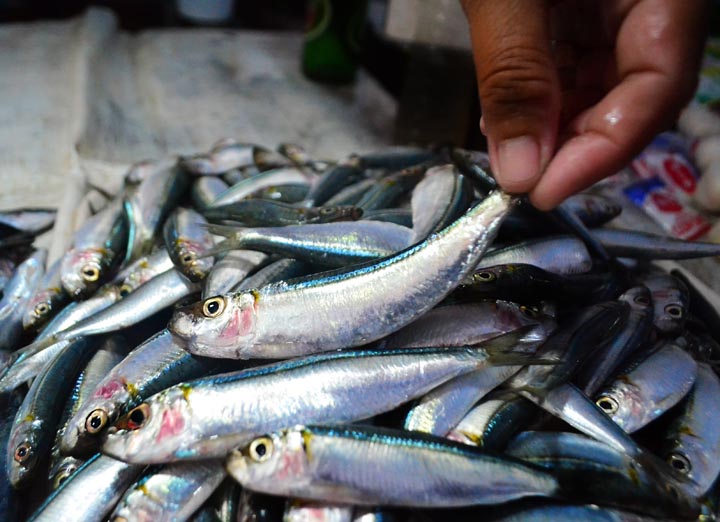
Sardine fishers in Dinagat Islands lamented their declining catch due to overfishing and harmful fishing practices of encroaching commercial fishers, who, they pointed out, are barred from municipal waters by law.
Fisherfolk farmers revealed their sardine catch situation during a recent policy dialogue between their group and concerned government agencies such as the Department of Agriculture and Bureau of Fisheries and Aquatic Resources (BFAR).
“[We had plenty of catches] before. But now, not anymore because we see fishing boats using superlight even closer to the shore. This drives us, small fisherfolk, farther into the deeper part of the ocean. Meanwhile, the commercial fishers using superlight are able to catch fish inside our municipal waters,” Eric Sarcauga, a sardine fisher from Dinagat Islands, was quoted as saying in a statement issued by nongovernment organization Oceana, the organizer of the virtual dialogue.
Celso Suquib, an Integrated Fisheries and Aquatic Resources Management Council (IFARMC) representative, concurred with Sarcauga’s sentiments, adding that illegal fishing serves as one of their biggest challenges today, such as the use of superlight, a strong light using halogen or metal halide used to easily attract schools of fish.
“The biggest challenge for us is illegal fishing. We are now having a hard time catching sardines because of superlight entering the municipal waters. We, fisherfolk, are calling on the government for immediate action and intervention against illegal fishing. Help us here in Dinagat Islands so that we can fish peacefully and improve our lives,” Suquib said in Filipino.
Oceana said the team of Dr. Wilfredo Campos of the University of the Philippines-Visayas discovered that sardines in Fisheries Management Area (FMA) 7, which covers Bicol and Samar, were already overfished.
“The team of Dr. Campos, which monitored the movement of sardine stock as well as fishing vessels in the waters off Bulan, Sorsogon and Samar Sea, estimated the annual catch for 2020 at 45,000 metric tons 60 percent of which came from Bulan where the larger vessels are based,” Oceana said.
“Dr. Campos also emphasized their findings on the exploitation rate of sardines in the area of 0.8 which meant the stock was already overexploited,” Oceana added.
Citing Philippine Statistics Authority (PSA) data, Oceana said the catch of bali (tamban) and fimbriata (lawlaw/tuloy) sardine species significantly declined from 442,045.75 metric tons in 2010 to 325,226.20 metric tons in 2019.
Oceana noted that Agriculture Secretary William D. Dar is cognizant of the country’s declining sardines catch, citing his speech during the virtual policy dialogue.
“There is a downward motion in the production of sardines in the country due to several factors like harmful and illegal fishing practices, the looming threat of global climate change, and the continuous destruction of the ocean ecosystem due to pollution,” Dar said.
“It also does not help that we are currently in a Covid-19 pandemic which exposes the weaknesses of our food system from fragmented supply chains to inefficient production techniques,” he added.
Oceana together with the fisherfolk urged the government to immediately implement the National Sardines Management Plan (NSMP) and ensure its adoption in the 12 FMAs of the country.
“Implementing the much-awaited NSMP in all 12 FMAs would help cover and come up with solutions for the problems faced by sardine fishers and the country’s worsening state of sardines,” said Atty. Gloria Estenzo Ramos, vice president of Oceana.
“The time to act is now. We are in a critical stage and we are in dire need of sustainable intervention for the management of our sardine fisheries. We need to work together in creating concrete and bold action to protect our fisheries and fisherfolk,” Ramos urged.
—

